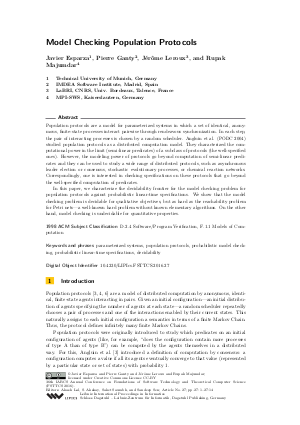Model Checking Population Protocols
Authors Javier Esparza, Pierre Ganty, Jérôme Leroux, Rupak Majumdar
-
Part of:
Volume:
36th IARCS Annual Conference on Foundations of Software Technology and Theoretical Computer Science (FSTTCS 2016)
Part of: Series: Leibniz International Proceedings in Informatics (LIPIcs)
Part of: Conference: IARCS Annual Conference on Foundations of Software Technology and Theoretical Computer Science (FSTTCS) - License:
 Creative Commons Attribution 3.0 Unported license
Creative Commons Attribution 3.0 Unported license
- Publication Date: 2016-12-10
File

PDF
LIPIcs.FSTTCS.2016.27.pdf
- Filesize: 0.52 MB
- 14 pages
Document Identifiers
Subject Classification
Keywords
- parameterized systems
- population protocols
- probabilistic model checking
- probabilistic linear-time specifications
- decidability
Metrics
- Access Statistics
-
Total Accesses (updated on a weekly basis)
0Document
0Metadata
Abstract
Population protocols are a model for parameterized systems in which a set of identical, anonymous, finite-state processes interact pairwise through rendezvous synchronization. In each step, the pair of interacting processes is chosen by a random scheduler. Angluin et al. (PODC 2004) studied population protocols as a distributed computation model. They characterized the computational power in the limit (semi-linear predicates) of a subclass of protocols (the well-specified ones). However, the modeling power of protocols go beyond computation of semi-linear predicates and they can be used to study a wide range of distributed protocols, such as asynchronous leader election or consensus, stochastic evolutionary processes, or chemical reaction networks. Correspondingly, one is interested in checking specifications on these protocols that go beyond the well-specified computation of predicates. In this paper, we characterize the decidability frontier for the model checking problem for population protocols against probabilistic linear-time specifications. We show that the model checking problem is decidable for qualitative objectives, but as hard as the reachability problem for Petri nets - a well-known hard problem without known elementary algorithms. On the other hand, model checking is undecidable for quantitative properties.
Cite As Get BibTex
Javier Esparza, Pierre Ganty, Jérôme Leroux, and Rupak Majumdar. Model Checking Population Protocols. In 36th IARCS Annual Conference on Foundations of Software Technology and Theoretical Computer Science (FSTTCS 2016). Leibniz International Proceedings in Informatics (LIPIcs), Volume 65, pp. 27:1-27:14, Schloss Dagstuhl – Leibniz-Zentrum für Informatik (2016)
https://doi.org/10.4230/LIPIcs.FSTTCS.2016.27
BibTex
@InProceedings{esparza_et_al:LIPIcs.FSTTCS.2016.27,
author = {Esparza, Javier and Ganty, Pierre and Leroux, J\'{e}r\^{o}me and Majumdar, Rupak},
title = {{Model Checking Population Protocols}},
booktitle = {36th IARCS Annual Conference on Foundations of Software Technology and Theoretical Computer Science (FSTTCS 2016)},
pages = {27:1--27:14},
series = {Leibniz International Proceedings in Informatics (LIPIcs)},
ISBN = {978-3-95977-027-9},
ISSN = {1868-8969},
year = {2016},
volume = {65},
editor = {Lal, Akash and Akshay, S. and Saurabh, Saket and Sen, Sandeep},
publisher = {Schloss Dagstuhl -- Leibniz-Zentrum f{\"u}r Informatik},
address = {Dagstuhl, Germany},
URL = {https://drops.dagstuhl.de/entities/document/10.4230/LIPIcs.FSTTCS.2016.27},
URN = {urn:nbn:de:0030-drops-68628},
doi = {10.4230/LIPIcs.FSTTCS.2016.27},
annote = {Keywords: parameterized systems, population protocols, probabilistic model checking, probabilistic linear-time specifications, decidability}
}
